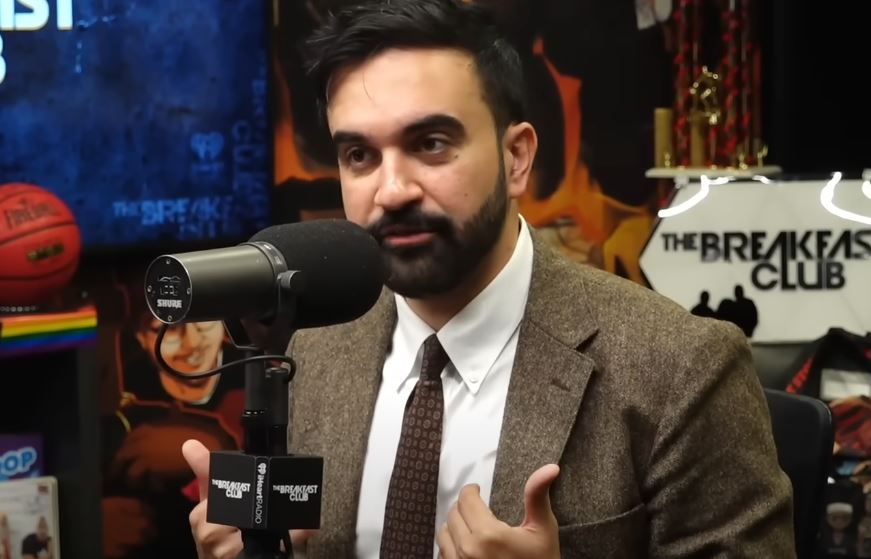
In a place where riches frequently defines leadership, Zohran Mamdani’s humble lifestyle is remarkably evident in his estimated net worth of between $200,000 and $300,000. His financial declarations show an oddly modest portfolio consisting of a small piece of land in Uganda, a state assembly salary, and minuscule music royalties from his days as a rapper. By political standards, he stands out in a field full of millionaires because his money is surprisingly good at bolstering his credibility.
Mamdani was born in 1991 in Kampala, Uganda, into a family that valued both creative talent and rigorous academics. His mother, Mira Nair, is a celebrated filmmaker who has worked on films including Monsoon Wedding and Mississippi Masala, and his father, Mahmood Mamdani, is a Harvard-trained professor whose work in African history and politics has received widespread appreciation. Because of their success, Zohran’s early years were influenced by privilege, including access to prestigious schools, exposure to international concepts, and ties to the arts and academic community. However, a conscious shift away from luxury and toward rent-stabilized apartments and subway rides as markers of solidarity with regular New Yorkers has significantly enhanced his adult life.
Bio Data and Career
| Category | Details |
|---|---|
| Full Name | Zohran Kwame Mamdani |
| Year of Birth | 1991 |
| Place of Birth | Kampala, Uganda |
| Heritage | Indian-Ugandan |
| Nationality | American (Naturalized 2018) |
| Profession | Politician, Community Organizer, Former Rapper |
| Current Role | Democratic Nominee for New York City Mayor (2025 election) |
| Net Worth (Estimate) | $200,000 – $300,000 |
| Main Assets | Four acres of land in Jinja, Uganda valued at $150,000–$250,000 |
| Annual Salary | $142,000 (NY State Assembly); Projected $260,000 as NYC Mayor |
| Residence | Rent-stabilized apartment in Astoria, Queens |
| Parents | Mahmood Mamdani (Professor), Mira Nair (Filmmaker) |
This is demonstrated by the figures of his net worth. His biggest asset is a four-acre plot of property in Jinja, Uganda, which he bought more than ten years ago and is currently worth between $150,000 and $250,000. His $142,000 state assembly salary and roughly $1,200 in leftover rap royalties annually make up the most of his riches; these sums are small by political standards but remarkably comparable to what many New York artists may report. This degree of modesty has been quite useful for his campaign, enabling him to represent the struggles of workers, students, and tenants in a city where billionaires dominate the skyline.
His financial situation is unique since it aligns with his political stance. Promises of improved tenant protections, free public transportation, and more taxes on affluent institutions like Columbia University have been the cornerstones of Mamdani’s career. There is no denying the irony—Columbia, his father’s job and the place where he grew up, has frequently been the subject of his talks. However, rather than avoiding the conflict, Mamdani asserts that privilege may and ought to be used to further justice. His campaign’s ability to use biography as a political tool has been astounding.
His wealth is remarkably low when compared to other political personalities. His opponent for the Democratic nomination, Andrew Cuomo, has an estimated net worth of $10 million. The current mayor, Eric Adams, has substantial investments and real estate holdings. Mamdani’s finances, on the other hand, appear shockingly modest and more representative of the life of a middle-class professional than a career politician. Younger voters who are fed up with politics driven by wealth have found great resonance in this difference.
His financial situation is further textured by the tale of his history. Mamdani briefly pursued music under the stage name Young Cardamom upon his graduation from Bowdoin College. He collaborated with actress Madhur Jaffrey on the lighthearted hip-hop song “Nani.” Even though the initiative never generated a large cash, it represents his artistic beginnings and links him to a cultural narrative that many politicians are unable to claim. His personal wealth appears even more genuine—less manufactured, more lived—when paired with his activism and grassroots organizing.
Mamdani gained notoriety during the epidemic by promoting community assistance networks and fighting for the rights of renters. His little funded action stood in stark contrast to the retreat of wealthy politicians to opulent estates. He has mastered the art of persuading doubters that his ideas are based on everyday reality rather than theoretical concepts by living out his politics. Supporters view his tiny net fortune as incredibly resilient evidence that he does not pursue authority for personal gain.
Mamdani’s narrative has important wider ramifications. His modest socioeconomic status challenges preconceived notions about leadership in a time when politics and money are very comparable to parallel games—one for working people, another for billionaires. Even though his wealth is modest by elite standards, it represents a change in American politics toward authenticity. With his campaign, Mamdani is continuing the tradition of leaders like Alexandria Ocasio-Cortez, who demonstrated that relatability can be a more powerful asset than money.
Even though his pay would more than double to $260,000 year if elected, he would still be far from wealthy in comparison to other national leaders. Even if this rise is substantial, it won’t change the core of his financial identity. The story of an immigrant son of academics who rejects opulence and leads from modesty, influenced by privilege, will continue to be markedly better.
